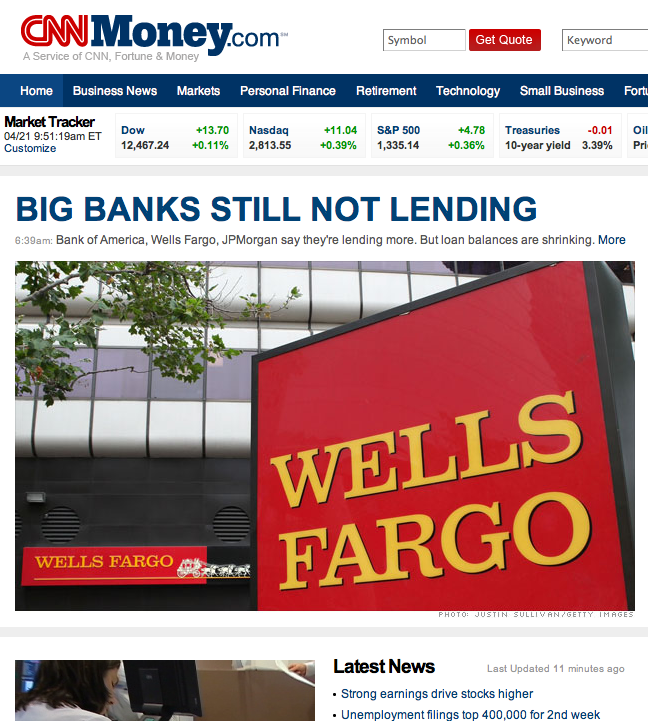Loans
When Average Credit is Better Than Excellent Credit: Data Points
August 23, 2011
Back in the wild days of Merchant Cash Advance(MCA), credit score was not only unimportant to the underwriting process, but irrelevant altogether. Business owners with FICO scores reaching down into the 300’s were obtaining 150% of their monthly average processing volume without question. That era came to an end and with good reason. Defaults and losses soared and some funding providers went under. If ignoring credit had continued, it may have lead to the industry’s demise.
In some respects, MCA providers overcompensated by making credit score the only factor, rather than simply incorporating it into the complete underwriting analysis. “FICO Under 500? Declined”, “Less than 550? No thanks!” “Under 600, Don’t bother”. This became the status quo during the conservative years of MCA. And yet business owners with credit scores as high as 800 were ending up in default. After much head scratching, some underwriters began digging a bit deeper. A healthy community burns out all at once in February, an entire industry underperforms, historical cash flow activity predicts survival rate, multiple partner businesses do better than sole proprietorships… While these were just an example of conclusions that could be reached, they’re all potentially part of an underwriting system, a system built on data points. We found a great example on an old personal blog of Jeff Mitelman, the CEO of Canadian based funding source, Advanceit. To quote Jeff,
“Here’s a practical application of using data points:
Merchant A has a restaurant in PEI, below average credit, a maxed out credit card & has applied for a $25,000 advance in June.
Merchant B has a restaurant in Southern Ontario, excellent credit & has applied for $50,000 in January.
With this information alone, B is clearly the better decision.
Now consider this new insight into the transactional history of accounts with similar characteristics that only a knowledge base can provide Advanceit has funded 50 restaurants in PEI, 47 of which have repaid without issue. The two of the 3 that didn’t repay stopped transacting in January. The historical credit card sales of restaurants in PEI peek in July & hit their lowest point in December.
Advanceit has funded 25 restaurants in Southern Ontario, 18 of which have gone to collections, 10 of which had write offs below the funded amount. Of the 10 losses, 8 of them occurred in March. The historical credit card sales of restaurants in Southern Ontario peek in December & hit their lowest point in February.
When evaluating the same two merchants through this lens, A is a no brainer & B is a recipe for disaster.“

A lot of the veteran MCA providers already implement a type of data points system, whether it be an objective scoring model or something more subjective. With the surge of many small ISOs putting their skin in the game and funding their own accounts, this advice should be not overlooked. Without data points, you’re shooting in the dark. Do not forget that your data points need substance either. If the only account funded in the State of Wyoming defaults, that should not be sufficient to cast off all businesses in Wyoming.
Credit is not the only factor, nor is it a solid predictor of the future. It’s a solitary piece of the Merchant Cash Advance puzzle. Don’t believe us? Take it from Jeff, it’s a game of “Learning by Losing.” Do your best.
– The Merchant Cash Advance Resource
http://www.merchantcashadvanceresource.com
Image copyrighted by 123RF
No New SBA Loans Being Accepted. Don’t Understand? We’ll Draw You a Picture
August 23, 2011
On September 27, 2010, the Small Business Administration(SBA) temporarily sweetened the deal on the popular 7(a) loans. As part of the Small Business Jobs Act, government backed default guaranties rose to 90% and many of the major fees were waived.
By late December, the funds for this program had been fully allocated and exhausted. But the announcement was poorly communicated, resulting in thousands of unsuspecting bankers and applicants left stranded and confused. To deal with the drama, the SBA set up queues, where applicants were either placed on standby to take the place of a cancelled Jobs Act loan or to be transitioned into the regular 7(a) loan without the deal sweeteners.
But leave it to the SBA to underestimate the intelligence of their clients. Worried that bankers and business owners might not understand the concept of closing one program and offering them another, they drew a picture.

Actual image being used on SBA.gov to explain the status of Jobs Act loans
In case the phrase “No New Loans Being Accepted” is obscure and cryptic, we can decipher the message using the Daily Transition Phase Alert meter. It’s a state of the art, super genius meter, that was handcrafted by NASA scientists, and topped off with the modern pizazz of a traffic light. Green is GOOD. Red is BAD. Big dollar sign GOOD. Small dollar sign BAD. If the meter is yellow, speed up and try to beat the light but make sure there are no cops behind you first.
Bankers should start using this system en masse. Instead of an outright decline, they can simply inform applicants that their lending ability is in Phase Red. Persistent businesess can take their chances in the underwriting process and battle it out using the Daily Transition Phase Alert meter 2.0. Left foot on $. Right hand on. But watch out for blue because blue is very bad! Blue automatically allows the bank to raise your business checking account fees and increase your credit card processing rates.

The Amazing Daily Transition Phase Alert Meter 2.0!
While your bank is busy playing games with you (they’re not just mind games anymore!), alternative financial firms such as Merchant Cash Advance providers are busy funding applicants in less than 7 days on average. The process is easy, only minimal paperwork is required, it’s credit score flexible, and every business is doing it these days. Want to find out the status of your Merchant Cash Advance application? We’ll hand draw you a picture:

Choose your funding source wisely…
– The Merchant Cash Advance Resource
Upfront Underwriting Fee Scams Still Persist
August 23, 2011
“Based on what you’ve shared, you qualify for a $50,000 loan, so now you just need to send in the application along with a check for $500 to pay for the underwriting.” SCAM!
Many Merchant Cash Advance(MCA) sales reps encounter business owners who have been so defeated by scams, that they are skeptical when something legitimate actually comes along. Some MCA providers may assess fees at the time a deal is funded, but at no point should a business be expected to make a payment prior to that. Think about it: If you are paying just for the opportunity to be considered for a loan, what financial incentive would the lender have to actually make loans? They can simply tell you that you have been declined and walk away with the fee.
The issue does not seem to persist in the MCA industry itself, but rather by con artists pretending to be traditional lenders. According to Dun & Bradstreet:
“Be especially wary of unsolicited phone calls, emails, or letters from prospective lenders making claims that sound too good to be true. If a prospective lender guarantees a loan without checking your credit or reviewing your business plan, proceed with caution. Also beware of lenders who cater to applicants with bad credit, pressure you to make a decision on the spot, and lenders who request payment by Western Union to foreign addresses.” Full article From D&B here.
We’re not looking to scare anyone, but you can never be too careful. Most of the MCA providers in our directory are listed with the Better Business Bureau. When in doubt, check them out!
-The Merchant Cash Advance Resource
Banks Don’t Care About SBA Loans or Your Tax Dollars
August 23, 2011
Need proof the Small Business Administration (SBA) does more harm than good? The SBA has been protecting banks for decades against up to 90% of losses on eligible business loans. Funded by taxpayer money, it was designed to stimulate lending in the private sector. But banks have perverted the system and are using it as a literal blank check to commit fraud and reap profis.
With the Government footing the bill on defaults, banks have made it their business to make as many loans as possible to generate fees, regardless of whether or not the borrowers could repay. We have proof and it comes right from the source in a report prepared by the Office of the Inspector General.
MATERIAL DEFICIENCIES IDENTIFIED IN
EARLY DEFAULTED AND EARLY PROBLEM
RECOVERY ACT LOANS
Report Number: ROM 10-19
Date Issued: September 24, 2010
Prepared by the
Office of Inspector General
U. S. Small Business Administration
The Office of the Inspector General performed an audit on loans that had problems or defaulted especially early. On the sample they selected, it was determined that 82% of the loans should not have been made at all. From the report: “The audit identified material deficiencies in 32, or 82 percent, of the 39 early defaulted or early-problem Recovery Act loans reviewed, which resulted in the disbursement of approximately $5 million to borrowers who could not repay or were ineligible for the loans.“
82%?! And no, these loans were not flagged for technicalities, but rather for wildly incredible mistakes or intentional malice. This includes:
- Failure to request a business credit report on the borrower
- Using a borrower’s old credit report since a current credit report would make the applicant ineligible
- Using financial statements by the applicant that were more than 2 years old
- Not verifying business income
- Not verifying the age of the business
- Ignoring the borrower’s financial reports and creating their own figures that would make the applicant eligible
- Making loans to borrowers that did not even own businesses
- Failure to report fees both earned and paid for referrals to the SBA as required
An example: “One lender used 2007 personal income of $443,110 for a loan approved on April 13, 2009, even though the borrower noted annual income of only $750 on its April 1, 2009 loan application.”

As of June 30, 2010, there were a total of 484 early-defaulted or early-problem Recovery Act loans approved for $69,205,600. If the audit is any indication, it’s because 82% of the time, the banks just didn’t care. And why should they? The Government has only stepped up the effort to spur lending using this massively failed approach.
See more on that in our article, More Funding for Small Business Loan Programs – A Dysfunctional System
It may be interesting to note that while the traditional banking system is mired in corruption, an alternative financial product known as a Merchant Cash Advance (MCA) has been helping small businesses for years. With no taxpayer default guaranties, flexible terms, and an openness to borrowers of all credit types, it’s on track to become the most sustainable form of financing for businesses in the U.S.
SBA Loan vs. Merchant Cash Advance
Perhaps we’re a tad biased since we follow the MCA industry religiously, but one thing is for certain, don’t trust your banker for a second. They’re trying to pull a fast one almost 82% of the time.
– The Merchant Cash Advance Resource
Credit Card for Business Owners? Forget it!
August 23, 2011Posted on April 4, 2011 at 9:59 PM
“Anyone that owns a small business is automatically declined,” revealed an inside source at a major credit card issuing bank. A friend of ours that we’ll call Dave (name changed), is an underwriter in charge of approving credit card applications. We were discussing tighter credit standards for consumers, an issue we felt to be of little relevance to business credit, until it got interesting.
According to Dave, and the bank doesn’t make this information public, small business owners and the self-employed are issued automatic declines for cards. “Just to get a simple credit card?”, we asked. Dave explained that their data indicates consumers are less risky than the self-employed. We dug deeper and were told his:
- Employed consumers are more likely to have a fixed budget and steady income.
- Business owners experience continuous ups and downs. During a down, they are more likely to supply their employees with their steady paychecks and skip out on the credit card payment until cash flow improves. If they did it the other way around, they would lose their employees and the business wouldn’t last.
- Employed consumers are better equipped to prove their income since they have verifiable documents such as W-2s or paystubs.
- Business owners are less able to verify their income, more likely to show losses on their tax returns, and less willing disclose their true financial status. Though this may serve them well come tax time, it works against them on credit applications.
But that shouldn’t discourage small business owners from applying. Dave concedes they’ll consider extending credit to businesses open longer than 20 years so long as the applicant has above 720 credit. Ouch!
The Ugly Face of Business Credit Cards
So if you don’t make the cut, or even if you do, credit cards aren’t so attractive these days anyway. The Credit Card Act of 2009 made major changes for consumers but NONE for businesses. In an article by creditcards.com, titled “10 ways business credit cards are different“, is a list of many dangers to look out for. If you’re a business owner, these are the pitfalls:
2009 made major changes for consumers but NONE for businesses. In an article by creditcards.com, titled “10 ways business credit cards are different“, is a list of many dangers to look out for. If you’re a business owner, these are the pitfalls:
- A teaser rate can be as short as 6 months, 3 months, or even 1 day. That attractive 2% rate can be increased on a whim as soon as you sign up or start using the card.
- There is no minimum amount of time to notify you of a payment due. Consumers are required to receive their bill at least 21 days in advance of the payment due date. For business owners, you might not get the bill until the day before!
- Your due date can change every month. Don’t get too comfortable paying on the 30th every month, your card company can switch it up to throw you off and entrap you with late fees.
- There are no late fee penalty limits.
- Payments are applied to the balance with the lowest interest rate first, instead of to the highest interest rate like consumer cards.
- The business owners are usually personally liable for the business card’s debt.
What’s the Alternative?
It’s bad news galore but there’s light at the end of the tunnel. A unique financial product known as a Merchant Cash Advance (MCA) offers all the positive features of a credit card and spits out the negative. Any business that accepts credit/debit card payments from their customers is eligible. Different than a loan, a MCA provider purchases the future card revenues of the business in exchange for a lump sum of cash today. The benefits and differences are truly astounding.
- Good credit is not necessary.
- Funds can be received in under a week. (You can barely get a credit card that quick)
- A business can qualify with as little as 3 months in business.
- The “rate” or the cost of the funds can’t change. Once the cost of funds has been established and executed, it remains the same. The balance does not increase with time nor is there any element of interest.
- Because the balance is only reduced by withholding a percentage of card sales, less funds are withheld in slow periods, and more in strong periods. This tackles the issue of business ups and downs.
- There are usually no personal guarantees.
- Additional funds can be made available before the balance has been reduced to zero.
- Personal income does not need to be verified, just the monthly credit/debit card sales volume.
- Your credit can’t be negatively affected since it is not a loan.
Becoming a First Choice Option
A Merchant Cash Advance is not a last resort method of financing and is quickly becoming a first choice pick in the business world. Certainly better than business credit cards, they also rank better than SBA Loans. [SBA Loan vs. Merchant Cash Advance]
Before you fill out that credit card application, just remember what our friend Dave said. “You’re automatically declined.” Say goodbye to the card issuing naysayers and SBA Loan ploys. The lending system is too far broken to be aggravated about it anymore. If your business needs capital, you can simply sell your future card sales in exchange for cash today. Check out the true direct funding sources in our directory and walk away with flexible financing your business can depend on.
– The Merchant Cash Advance Resource
Banks Still Not Lending But Don’t Take Our Word For it
August 23, 2011Originally published 4/21/11
We’ve preached that banks aren’t lending and we feel confident in that assessment. This was today’s news headline:

According to Fortune, the four largest banks have reduced their loan balances by $210 Billion over the past year. Now about three years out from the height of the financial crisis, capital is becoming harder to access, not easier. “That’s partly because banks must put the worst mistakes of the bubble era in the rearview mirror, by taking losses on bad loans and letting other low-quality portfolios run off. Both those moves lead to lower loans outstanding.” With no tolerance for anything but the highest quality borrowers, business owners have few places to turn.
Now just might be the time to look into a Merchant Cash Advance...
– The Merchant Cash Advance Resource
Bank Loan Advertisements are nothing but a bait and switch
August 23, 2011
 We stay in touch with many people in the financial industry, and not just Merchant Cash Advance. Back in late March we learned that lending was so tight, that credit cards were barely attainable. That was when the unemployment rate was 8.8% and as of May 2011, it’s back up to 9.1%. That was when the economy was expected to grow by 2.9% in 2011 but is now on pace for 2.7%. The point? If it was impossible to get a loan back in March, then how much worse could it get?
We stay in touch with many people in the financial industry, and not just Merchant Cash Advance. Back in late March we learned that lending was so tight, that credit cards were barely attainable. That was when the unemployment rate was 8.8% and as of May 2011, it’s back up to 9.1%. That was when the economy was expected to grow by 2.9% in 2011 but is now on pace for 2.7%. The point? If it was impossible to get a loan back in March, then how much worse could it get?
An insider shares it can get worse, much worse. Our friend Tim (name changed) is the manager of the small business lending unit of a major national bank. Any loan less than $1 Million dollars is considered to be for small business. Tim’s unit is on track to do more loans this year than last year and none of them are going to retail stores or restaurants. Did we hear that right?
“Retail stores and restaurants are too flakey to give money to.” That wasn’t just his opinion either because that’s actually part of the bank’s underwriting policy. They are completely prohibited from lending to those business types. So we had to ask…
What if they had 25 years in business? Declined.
What if the guarantors had 800 credit? Declined.
What if they had $5 Million in cash reserves in the bank? Declined.
What if…? Declined. Declined. Declined.
There is no criteria that would make them eligible, period. Tim admits that the interest charged on a loan is not profitable by itself anyway so to take any degree of default risk even if it’s small, is not worth it. Instead, they rely on their loan clients to open a business checking account with them, use their merchant processing, and sign up for other services on which they can charge fees and earn income. Their unit has an average turnover time of 3 months from the time the application is submitted to the time the loan is funded.
“We usually get a jump on setting them up with all our services right when they apply for the loan, so we can start earning on them right away,” Tim said. We wondered why they wouldn’t let restaurants and retail stores apply then. “Oh we let them apply for loans… we just don’t tell them they’re declined until after we’ve locked them into other fee generating services. They’re unlikely to pack up and change banks after that so it works out for us.”
There’s a term for this tactic and it’s called a ‘bait and switch.’ There really seem to be no loans for the businesses that need them, an assertion bolstered by the Small Business Administration’s 2011 1st Quarter report. Lending to small businesses has fallen by $15 Billion.
So where’s the money?
There are still alternative sources available, but we’ve yet to find anything that rivals the speed and flexibility of a Merchant Cash Advance (MCA). Too many small businesses hold out the hope that a bank will help them and pass up the opportunity to obtain alternative financing like a MCA. But how many missed opportunities will it take until it’s too late? How many businesses will sign up for checking accounts and expensive merchant processing, only to find out that no loan is coming and all they’ve acquired is an expensive long term contract for no value in exchange.
If you’re a restaurant or retail store, you can research our directory of verified funding providers HERE. Don’t wait for the bank to approve a loan they’re not allowed to approve and instead get what’s most important, the capital to grow.
– The Merchant Cash Advance Resource
True Interest Free Loans
July 19, 2011
We thought we’d heard it all: Free credit card machines, free POS systems, and now there’s even FREE money. According to their recent press release, Merchant Money in Spring, TX is now offering a 90 day INTEREST FREE loan to businesses that switch to their processing service. The catch? the loan is capped at 15% of their average monthly processing volume with a maximum loan of $5,000.
That means a business processing $10,000 on average can get a $1,500 loan just for changing their merchant account. That’s not that impressive and neither is the rest of the fine print, which includes the following:
- Minimum FICO score of 650
- Minimum 2 years in business
- Minimum $3,500 a month
$10,000 is enough to qualify for $12,000 to $15,000 on a Merchant Cash Advance. Though a Merchant Cash Advance is not free, it does allow the business owner to obtain enough capital to do something worthwhile. Not too mention there is no fixed timeframe for repayment.
So what is 15% of volume for a 90 day fixed term? Chump change. Maybe an interest free loan will make for good public relations but we think once their goodwill campaign starts facing defaults and losses, they’ll change their tune. Nothing spells disaster like an “interest free loan”. We wish them the best of luck.
Their site: http://www.interestfreebusinessloan.com
– The Merchant Cash Advance Resource





























